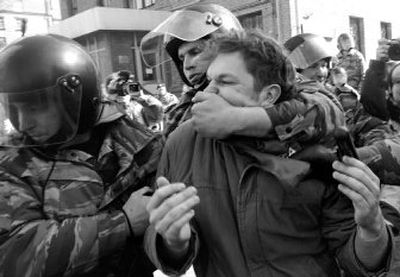Moscow activists arrested

MOSCOW – For beleaguered but feisty anti-Kremlin activists of various political stripes, Saturday was a day of drama and high tension, as young radicals and fed-up pensioners used a protest march and rally to taunt authorities.
The demonstrators succeeded in provoking the government to bare its teeth, with police arresting hundreds and trying to intimidate journalists.
The day was not without humor, however. After police detained one of the protest organizers, Garry Kasparov, a former world chess champion turned democratic activist, a rally speaker declared wryly that Kasparov was “playing chess” with the authorities.
Kasparov and his disparate allies, including a former prime minister and a writer who heads a radical youth group, share the goal of keeping protest alive in a country where Russian President Vladimir Putin’s government asserts increasingly centralized control.
Putin enjoys more than 70 percent support ratings, and many critics question why, given that his government appears intent on stifling even weak opposition. A maximum of 3,000 people made an attempt to protest in Moscow on Saturday, while authorities called out 9,000 officers to keep control.
Some opposition activists argue that the response is proof that Putin’s circle is neither as powerful nor monolithic as it seems.
In recent months, Kasparov and his associates, along with London-based tycoon Boris Berezovsky, a one-time political insider turned fierce Putin critic, have outlined similar visions of how greater democracy might come to Russia. Under their scenario, street protests keep the spark of dissent alive, and at some point the seemingly solid Kremlin power structure splits, and one faction goes over to the opposition. That is when true political competition and greater hopes for real democracy could take hold, they say.
Kasparov’s group, Other Russia, originally announced plans to hold a “Dissenters’ March” and rally Saturday centered on Pushkin Square, the Russian capital’s premier spot for such events. But they were denied permission after a pro-Kremlin youth group was given a rally permit for the same time and place.
City authorities offered Other Russia the use of a park in the Chistye Prudy area for its rally but said no march would be allowed because of the disruption it would cause.
Other Russia accepted the approved rally site but told supporters to gather informally near Pushkin Square and then walk the roughly one mile to Chistye Prudy.
The pro-Kremlin youth group, which had said openly that it obtained the permit to deny Pushkin Square to Other Russia, did not hold any event there, and by late Saturday morning the square was simply cordoned off by police.
Kasparov and some other activists were detained near Pushkin Square almost upon their arrival and were placed on a police bus. As he was being driven off, Kasparov managed to shout out an open window: “This regime is criminal. This is a police state. They arrest people everywhere.”
His lawyer later said he had been charged with “shouting anti-government slogans in the presence of a large group of people,” the Russian news agency Interfax reported.
Kasparov was released late Saturday evening after being fined $39 for violation of public order.